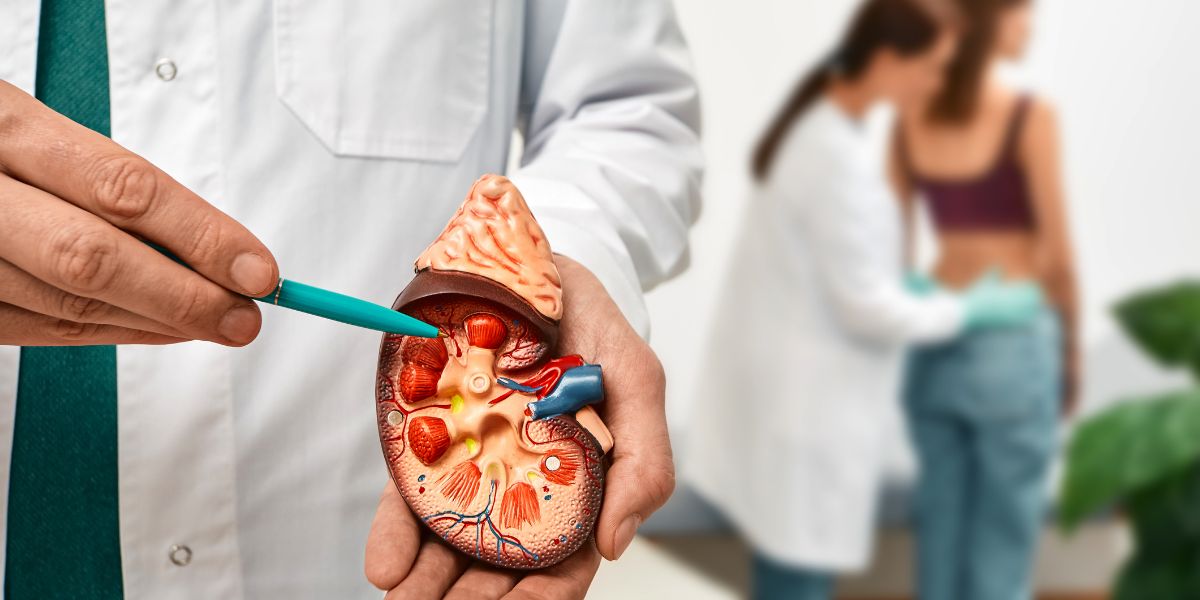The kidneys are remarkable organs of the human body that are responsible for many essential regulatory roles, including filtering the blood to keep it clean and chemically balanced.
Diabetes, however, can cause this vital filtering system to break down. High levels of blood sugar can damage the kidneys and cause them to fail, thus eliminating their ability to filter out waste, which over time can lead to kidney disease (nephropathy).
What are the Kidneys?
The kidneys are bean-shaped organs that are located near the middle of the back, just below the rib cage with one on each side of the spine.
Of the many roles they perform, one of the most important is the removal of waste products from the blood , which come from food and the normal breakdown of active tissues, such as muscles.
Other key functions of the kidneys include the secretion of three important hormones:
- Erythropoietin – which is released in response to hypoxia (low levels of oxygen at tissue level) to stimulate the production of red blood cells in the bone marrow.
- Calcitriol – the active form of vitamin D, which helps maintain calcium for bones and for normal chemical balance in the body
- Renin – an enzyme involved in the regulation of blood pressure
The Kidneys and Blood Sugar Levels
Each kidney is made up of millions of tiny blood vessels called nephrons, which act as filters to help keep the blood clean.
Each nephron interlinks with a small tube to keep useful substances, such as proteins and red blood cells, in the bloodstream and allow extra fluid and waste products to pass through, where they become part of the urine.
This filtration system can, however, be damaged by high levels of blood sugar. Excess glucose in the bloodstream can cause the kidneys to filter too much blood.
Over time, this extra work puts more pressure on the nephrons, which often results in them losing their vital filtering ability. This damage from unused glucose in the blood is what is known as diabetic kidney disease
Kidney Disease (Nephropathy)
Kidney disease generally occurs when the nephrons (tiny blood capillaries inside the kidneys), become damaged, causing them to lose their filtering capacity.
This loss of function can cause useful protein, such as albumin – the main protein in the blood to leak out of the kidneys and into the urinary system, as well as the build up of wastes in the blood. This serious condition is also referred to as nephropathy , which means disease or damage of a kidney.
Although the exact cause is unknown, poor control of blood sugar and high blood pressure ( hypertension ) are known to increase the risk of kidney damage.
In people with diabetes, nephron damage (diabetic kidney disease) is caused by excess glucose in the blood, which can act like a poiso, while elevated blood pressure can also damage the small blood vessels.
Looking after your kidneys
Protecting your kidneys and keeping them in good shape/health is essential for your overall health as these organs are responsible for many important/vital functions of the body.
You can help maintain the health of your kidneys by simply:
Drinking plenty of water
Staying hydrated, particularly during hot weather or when exercising , is key to ensuring your kidneys function properly.
Eating healthily
Eating a healthy, balanced diet – i.e. one that has a balance of fats, proteins, and carbohydrates – will ensure your body gets all the vitamins and minerals it needs.
Limit salt/sugar consumption and try and stay clear of foods that are high in saturated fat
Limit alcohol intake and avoid smoking
Drinking a lot of alcohol and smoking puts extra pressure on your kidneys as they have to work harder to remove toxins from your blood.
This is one of the many reasons why it’s recommended that you avoid smoking and limit your alcohol consumption to two small drinks a day (one small drink for women).
Keep an eye on blood pressure
Rising blood pressure , which is often linked to being overweight/ obesity , can increase your risk of kidney disease. There is often no clear cause of high blood pressure (hypertension) , which is why it is important to have your blood pressure checked regularly – ideally about once a year. This can be done free of charge at your GP surgery.






